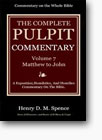The Thief in Paradise
by By G. Marsh Hilbourne & Michael T. Wark
Excerpts from "Thou Shalt Surely Die"
And Jesus said unto him, Verily I say unto thee, today shalt thou be with me in paradise. (Luke 23:43)
Many use this verse in support of the position that the dead are really alive. However, the context proves otherwise. The thief had just asked Jesus to remember him when He came into His kingdom:
And he said unto Jesus, Lord, remember me when thou comest into Thy kingdom. (vs. 42)
It is obvious that Jesus was not on His way to His kingdom as He was hanging on the cross. In His first advent Jesus came to die; in His second advent He will come to claim His kingdom. At this present time, Jesus still has not come as the triumphant conqueror to set up His kingdom and reign on earth with His chosen (Rev. 5:10).
Thus, when the thief asked to be remembered in the kingdom, Jesus assured him that he would be with Him in paradise. Did Jesus side step the thief's question? Or is it possible that He understood the kingdom and paradise to be identical: Isaiah 51:3 reads:
For the Lord shall comfort Zion: He will comfort all her waste places; and He will make her wilderness like Eden, and her desert like the garden of the Lord; joy and gladness shall be found therein, thanksgiving, and the voice of melody.
The Septuagint version renders it in this way:
And I will be comforting you, O Zion, and I comfort all her deserts, and I will place her deserts as paradise and her wilderness as the Lord's paradise. They shall find gladness and exultation in her, confession and the voice of praise.
The Septuagint version is very important to our study, because it shows how the Judeans two centuries before Christ used the word paradise in translating the Old Testament. We see from the above that they used the word paradise in place of Eden and the garden of the Lord. The word paradise obviously was a reference to the Garden of Eden. It was used to describe the original condition of the earth before sin entered. It was also used to describe the future, perfected Kingdom of God, when the earth would again become a "Paradise."
(Six hundred years ago Dante (a Roman Catholic) went so far as to claim that paradise was on top of purgatory on the far side of the earth.)
The Apostle Paul knew a man who went to paradise:
It is not expedient for me doubtless to glory. I will come to visions and revelations of the Lord. I knew a man in Christ about fourteen years ago. . . How that he was caught up [lit. away] into paradise, and heard unspeakable words, which it is not lawful to utter. (2 Cor. 12:1, 2, 4)
This passage often is read out of context to prove that someone went to paradise when he died. But if the man had died, he would not have been able to tell Paul of the experience. Verse one makes it clear that Paul was speaking of "visions and revelations of the Lord."
Thus, the man had a vision of paradise. He went there "in the spirit" only, as John did (Rev. 1:10). He saw paradise, the Kingdom of God in its restored condition, which the elect will inherit at the resurrection. But how can we reconcile this with Jesus seeming to say that they both would be in paradise on the day of their crucifixion? Luke 23:43, as written in most modern versions, appears to teach just that:
And Jesus said unto him, Verily I say unto thee, today shalt thou be with me in paradise.
However, a study of the original Greek text tells a different story. The following is the Greek with a literal English translation:
lego. . . "to you I am saying"
semeron . . . "today"
met emou . . . "with me"
ese . . . "you will be"
en to paradeiso . . . "in the paradise."
"To you I am saying today with me you will be in the paradise."
You will notice that it reads "saying today," rather than "you will be today in the paradise." In other words, Jesus told the dying thief that day: "You will be with me in paradise" (the future kingdom). Thus, Rotherham's Emphasized Bible renders this verse:
And he said unto him, Verily I say unto thee this day: With me shalt thou be in paradise.
The Concordant Literal New Testament reads:
And Jesus said to him, "Verily, to you am I saying today, with me shall you be in paradise."
The phrase to you I am saying today may sound strange to our ears today. However, there were many occasions in the Scriptures when today or this day was used to emphasize a noteworthy day. For example, Moses told Israel:
See I have set before thee this day life and good, and death and evil; In that I command thee this day to love the Lord thy God. . . (Deut. 30:15, 16)
The Companion Bible agrees in its notation on Luke 23:43
To day. Connect this with "I say," to emphasize the solemnity of the occasion; not with "shalt thou be."
Thus we conclude that Luke 23:43 teaches that the repentant thief on the cross shall receive a place in the Kingdom of God at the resurrection. The passage cannot be used to prove that the thief was alive that same day in paradise or heaven.











Comments